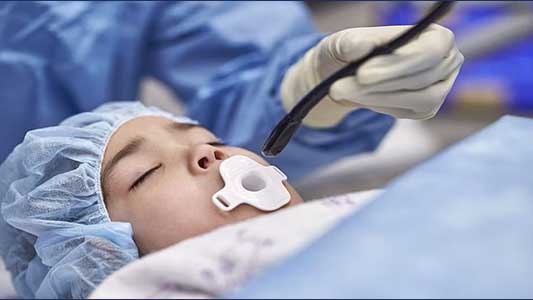Amsterdam, the Netherlands – Royal Philips, a global leader in health technology, today announced that its latest TEE transducer, designed to serve more patients with improved overall comfort, has received FDA 510(k) clearance.
Cardiovascular ultrasound has played a key role in the evolution of early diagnosis of structural heart disease, led by a technology pioneered by Philips: the ‘transesophageal echocardiography’ (TEE) ultrasound transducer. TEE helps cardiologists by providing highly detailed images of the heart and its internal structures. In structural heart disease, the quality of a 3D TEE image can help save lives. The clarity and perspective that come with 3D images exceed 2D alternatives. TEE is also a valuable tool for minimally invasive heart surgeries and procedures, transforming the treatment of damaged heart valves and congenital heart defects [2].
However, there were some patients who still couldn’t benefit from this advanced technology, including pediatric patients as small as 5 kg, adults at risk of complications [3], as well as complex cases such as ICU patients [4], where the transducer probe for 3D TEE was too large. Until now. Announced today, Philips’ new X11-4t Mini 3D TEE transducer is shifting that balance and opening 3D TEE imaging to previously unaddressed patients [5].
In many of our smallest patients undergoing complex intracardiac procedures like valve repairs, 3D TEE will give us a new and much needed perioperative tool.
– Dr. Brian Soriano, Pediatric Cardiologist (Washington, USA)
“In many of our smallest patients undergoing complex intracardiac procedures like valve repairs, 3D TEE will give us a new and much needed perioperative tool. For example, the X11-4t can help us visualize atrioventricular valves en-face. In many cases, this is a view that is difficult to achieve with traditional 2D TEE. 3D TEE will also be a more effective tool to communicate with the surgeons and will enable us to give good “surgeon views” of intracardiac structures” said Dr. Brian Soriano, Pediatric Cardiologist (Washington, USA).
“As a pioneer and leading innovator in cardiac ultrasound, our 3D ultrasound technology plays a critical role in many cardiac procedures. But it was frustrating to know that there were still some patients who couldn’t benefit from this hugely beneficial approach to image the heart, and as a result, would often require a different, more invasive, treatment approach,” said David Handler, VP and General Manager for Global Cardiology Ultrasound at Philips. “That’s why we’ve developed a new, even smaller mini 3D TEE transducer that can be used to help physicians serve a wider range of patients, from small children to fragile adults. With this innovation we can help reduce the need for general anesthesia [6] and lower the risk of complications, meaning patients may recover faster from procedures and can be discharged sooner.”
Early clinical users who’ve had the opportunity to carry out procedures with the new transducer have recognized its value. “With its excellent image quality and small footprint, the X11-4t transducer has the potential to reduce the complications of prolonged transesophageal imaging which can occur during our most difficult structural heart procedures. The transducer’s small size may also be better tolerated by patients during shorter procedures performed under conscious sedation and thus, provide additional high-quality imaging to improve procedural outcomes without the need for general anesthesia,” said Dr. Rebecca Hahn, Professor of Medicine at Columbia University Irving Medical Center (New York, USA) and Director of Interventional Echocardiography at the Columbia Structural Heart & Valve Center (New York, USA).
Improved patient comfort, with seamless workflow integration for clinicians
Developed to be easily tolerated by patients due to its 35% smaller size [7] and pill-shaped design, Philips’ new X11-4t aims to enhance the patient experience, with 87% of clinical respondents stating they believe the X11-4t may contribute to improved overall patient comfort [1]. Clinical staff can also benefit from a Mini Live 3D TEE solution that allows them to care for a wider range of patients, using the same hand control, procedure navigation techniques and workflow they are familiar with on Philips’ EPIQ cardiac ultrasound systems. As a result, echocardiographers require minimal additional training on this newest transducer.
The new transducer is compatible with Philips’ premium cardiology ultrasound portfolio including the EPIQ CVx and EchoNavigator image-guided therapy solution, allowing clinicians to deliver personalized, efficient, and clinically smart cardiac care to help improve outcomes and the patient experience. It also joins a portfolio that includes another significant innovation – VeriSight Pro – the first 3D intracardiac echocardiography catheter to miniaturize the same 3D imaging technology that powers TEE.
Transforming echocardiography with AI
More than 100 cardiac measurements are routinely performed as part of every echocardiography exam, taking up 50% of exam time [8]. The new X11-4t Mini 3D transducer reaffirms Philips’ commitment to deliver industry first innovations to help improve productivity and increase clinical decision support, which includes AI-enabled technology and automated tools like the Dynamic Heart Model to aid in procedural guidance. Philips AI-enabled cardiac ultrasound is building on the industry leading AI technology capabilities from DiA Imaging Analysis.
The Philips X11-4t ultrasound transducer is scheduled for commercial availability in 2024 and is pending CE mark in Europe.












